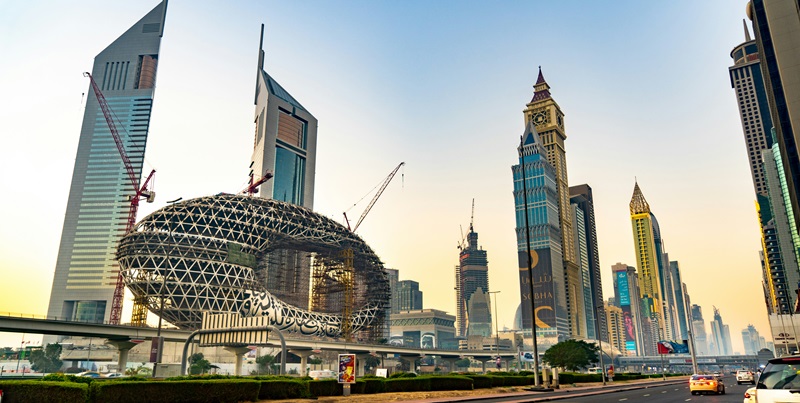Dubai Customs has launched a groundbreaking blockchain-powered platform aimed at enhancing commercial transparency and streamlining cross-border e-commerce. This significant initiative aligns with the Emirates Blockchain Strategy 2021, which ambitiously aims to transition 50% of government transactions to blockchain technology. Announced on July 8, this development marks a crucial step in establishing Dubai as a global e-commerce hub under the visionary leadership of Crown Prince Sheikh Hamdan bin Mohammed bin Rashid Al Maktoum. By leveraging advanced blockchain technology, Dubai Customs is set to revolutionize trade and logistics, significantly improving efficiency and transparency in these sectors.
Initially launched in January 2020 during the “3rd UAE Customs Week 2020,” the platform was piloted in September 2019 and is split into two pivotal phases. The first phase focuses on facilitating e-commerce export transactions through couriers, while the newly completed second phase handles e-commerce imports. This phase incorporates automated refunds, consolidated declarations, and a reduction in fees. These measures are expected to streamline processes that have traditionally been cumbersome, thus driving up efficiency and reducing operational costs for businesses involved in both exporting and importing goods. This phased approach ensures a controlled and effective implementation of new technologies.
Innovations in Trade and Logistics
Sultan Ahmed bin Sulayem, Chairman of the Ports, Customs, and Free Zone Corporation, emphasized that this blockchain initiative is poised to introduce several innovative changes within the realms of trade and logistics. The platform will ensure strict compliance with government regulations for all exports and imports, thereby fostering a more secure and regulated trading environment. A significant aim of the initiative is to boost Dubai’s non-oil trade, thereby diversifying its economy and establishing it as a leading e-commerce center. By streamlining customs procedures, reducing transaction times, and lowering costs, the platform provides a comprehensive solution to some of the longstanding challenges faced in international trade.
Additionally, the platform plays a crucial role in regulating goods returns by establishing a direct link between traders and customs systems. Such connections are vital for ensuring that the movement of goods is meticulously tracked, thereby enhancing accountability and reducing opportunities for discrepancies or fraud. In essence, the platform offers a seamless integration of customs operations, making the process more transparent for all stakeholders involved.
Enhancing Real-Time Visibility and Accuracy
The blockchain-powered platform also introduces the automation of customs declarations, offering real-time visibility and ensuring accurate and verifiable information for all participants. According to Dr. Abdullah Busnad, a senior customs officer, this technological advancement will substantially enhance collaboration with other government entities. It allows companies to track goods in real time, a feature that is vital for making supply chains more transparent and thereby reducing instances of fraud and counterfeit products. This increased transparency is a cornerstone in building trust among global trade partners and consumers alike, who can now have confidence in the authenticity and safety of the products being traded.
Such real-time tracking capabilities not only ensure operational efficiency but also align with Dubai’s broader digital strategy. Currently, Dubai’s government is actively collaborating with major logistics companies to test the platform. These trials aim at ironing out any potential issues before a broader rollout is undertaken. The success of these collaborations is pivotal, as it sets the stage for expanding the platform’s scope to include more stakeholders in the future. The overarching goal is to leverage blockchain technology to boost efficiency, transparency, and regulatory compliance in Dubai’s trade and logistics sectors, facilitating a more streamlined and secure global trading environment.
Future Prospects and Global Competitiveness
Dubai Customs has introduced an innovative blockchain-powered platform to boost commercial transparency and streamline cross-border e-commerce. This major step aligns with the Emirates Blockchain Strategy 2021, which aims to shift 50% of government transactions to blockchain technology. Announced on July 8, this initiative is pivotal in positioning Dubai as a global e-commerce leader, under the guidance of Crown Prince Sheikh Hamdan bin Mohammed bin Rashid Al Maktoum. Utilizing advanced blockchain, Dubai Customs plans to revolutionize trade and logistics, enhancing efficiency and transparency.
First launched in January 2020 during the “3rd UAE Customs Week 2020,” the platform was initially piloted in September 2019 and spans two crucial phases. The first phase facilitates e-commerce exports through couriers, while the recently completed second phase focuses on e-commerce imports. This phase integrates automated refunds, consolidated declarations, and lower fees, streamlining traditionally cumbersome processes. These changes aim to increase efficiency and cut operational costs for businesses involved in both exporting and importing goods. This phased approach ensures a smooth and effective technological transition.

